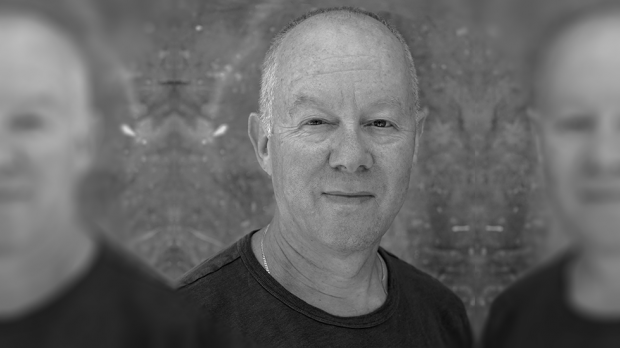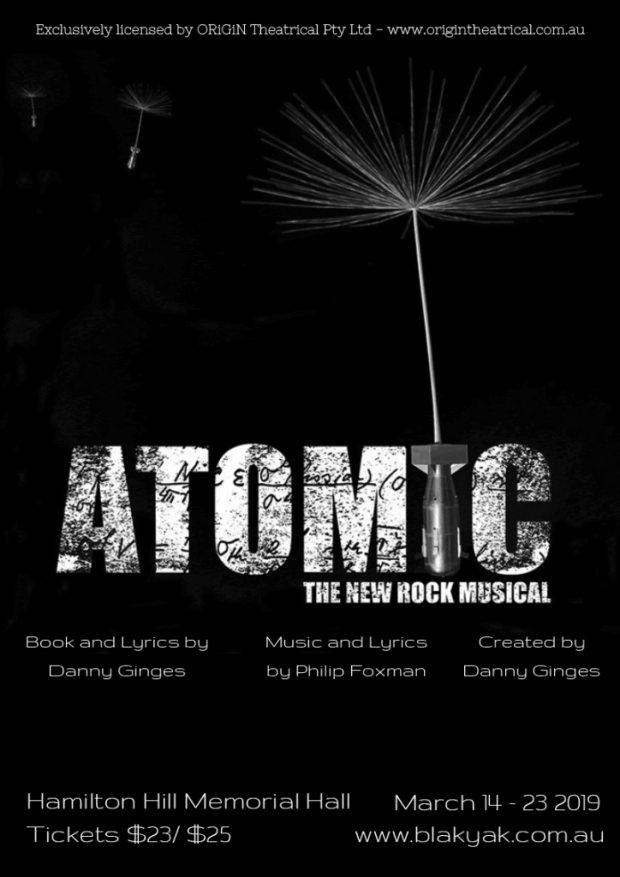
Blak Yak Theatre Company will be presenting the WA premiere of Atomic: The New Rock Musical at Hamilton Hill Memorial Hall from Thursday, March 14 until Saturday, March 23. It tells the true story of Leo Szilard, the brilliant physicist who unlocked the secret of atomic power but had war turn his hopes for mankind into a billion dollar arms race against Germany. Atomic was created by writer Danny Ginges with WA musician Philip Foxman, and together they take a unique approach to telling this fascinating tale with a full live rock band. BRAYDEN EDWARDS caught up with Ginges to talk about how the idea for the show came about, some of the colourful characters behind the Manhattan Project, and how it will all come to life onstage.
It’s fair to say this is a pretty unique story to write a play about. Where did the idea come from?
I grew up in the 60s, when the prospect of nuclear war was very real. As a child, I remember reading a guide on how to build a backyard nuclear fallout shelter. No horror movie ever scared me as much as those pragmatic pages. Decades later, I was curious about how the bomb that had haunted my childhood originated. So, I did some reading and came across Leo Szilard, the scientist who began the race for the bomb and then tried to stop it. I was surprised I’d never heard of him. Neither had anyone I knew. I thought his story worth telling, and hoped someone would make a feature film about him. Nobody did. So, one day I stopped waiting, and began writing.
Much of the play is based around the character of Szilard, the Hungarian born physicist that set the groundwork for the creation for the atomic bomb. What kind of character was he?
Szilard was a man who questioned everything, the way young children do. In his own words, “I assume I became a scientist because in some ways I remained a child.” Unlike his contemporaries, Szilard didn’t limit his questions to science. He scrutinised social and political norms as well. He had a good knowledge of history, a keen insight into human behaviour, and a mind that did not miss a trick. It gave him the ability to not only predict the future, but to shape it.
I heard he also originally patented his formula for the atomic bomb with the express purpose of no one ever having the ability to use it. How did he then come to be instrumental in it not only being created, but used in war?
In 1934, Szilard registered his patent for a nuclear chain reaction with the British Admiralty, rather than the Patent Office, because he didn’t want Nazi Germany to learn of it. When the uranium atom was split in 1939 in Berlin, the secret was out. In Szilard’s mind, the only possible defence against a German bomb was for America to build one first. President Roosevelt agreed. Then the race was on, with Germany well in the lead. However, by the time the bomb was ready to use, Germany was no longer a threat; America had spent two billion dollars developing the bomb, without congressional approval; and Roosevelt, who had authorised the project, was dead. There would have been some hard questions to answer after the war had the bomb not been used.
There were a lot of the brightest minds in the world bought together for the Manhattan project and some interesting personalities as well. I heard Richard Feynman had an annoying habit of playing the drums which was distracting for those trying to conduct experiments in the lab. What other interesting quirks did you find out about these people when researching the show?
There were plenty of interesting characters. Edward Teller, a Hungarian like Szilard, was the character Dr Strangelove was based on. Oppenheimer was fluent in eight languages. He also gave a poisoned apple to his Cambridge tutor. Feynman picked security locks for fun. Szilard had his best ideas in the shared bathrooms of his cheap hotels, and would spend long hours there. He would fall asleep in lectures, but would then open his eyes and challenge the speaker’s last statement – he did sleep, he just didn’t open his eyes right away. And he preferred his tea with milk and cream, but no tea.
It’s a difficult ethical question of whether it is acceptable to take lives to save lives. Where did Szilard sit on that matter and do you think there is a consensus on the decision to use the bomb now?
Szilard was very much against using the bomb on Japan. He sacrificed his future in nuclear physics in his attempts to stop it. But his primary concern wasn’t so much the cost in Japanese lives. It was the existential threat to mankind of a nuclear arms race with Russia, once America’s use of the bomb endorsed it as a legitimate weapon of war. Most people I’ve spoken to feel that the bomb’s use was justified to end the war and save lives. That’s the story people were told. But there were a couple of things that weren’t told. Like the fact that Russia declared war on Japan the day before Nagasaki was bombed, and wiped out the 800,000 strong Japanese army holding Manchuria in days. Or the US assurance that Japan could keep its emperor, which was only made after the second bomb was dropped. Those two factors might well have ended the war without the bomb. We’ll never know.
Putting these ideas into song for a musical must have been fun but also a bit challenging I imagine. What are the songs about and how are they delivered?
A bit challenging? For every song in the show, there are at least 10 in the waste bin. I wrote the story first as a film, but there was always music playing in my head. Predominantly Led Zeppelin. I wasn’t a songwriter, but fortunately I found a very talented composer, Phil Foxman, who’s had a lot of international experience writing great songs. And yes, it has been fun. Music is an essential part of the story because it’s an emotional journey, and music opens doors to emotions that nothing else can. Rock music lets you cover a lot of ground, from high energy power ballads like Stars and Stripes, to quiet introspective pieces like What I Tell Myself. The music sets the pace of the show. We hit the ground running and don’t let up till the final curtain.
What can people look forward to at these shows? Is it serious or fun or a mix of both?
One of my favourite comments, which I’ve heard a number of times, is “I’m not into musicals, but I love this.” I didn’t set out to write a conventional musical. I didn’t choose to use music for light entertainment. It’s there as a weapon. Its purpose is to tear your heart out. There are certainly lighter moments, but they too have barbs. I’ve met people who were so moved by the show they were unable to speak. We certainly go to some dark places. But we do end on a hopeful note, which is fitting. Szilard wanted his ashes tied to helium balloons. He felt it was better to look up than down. I more than agree.
